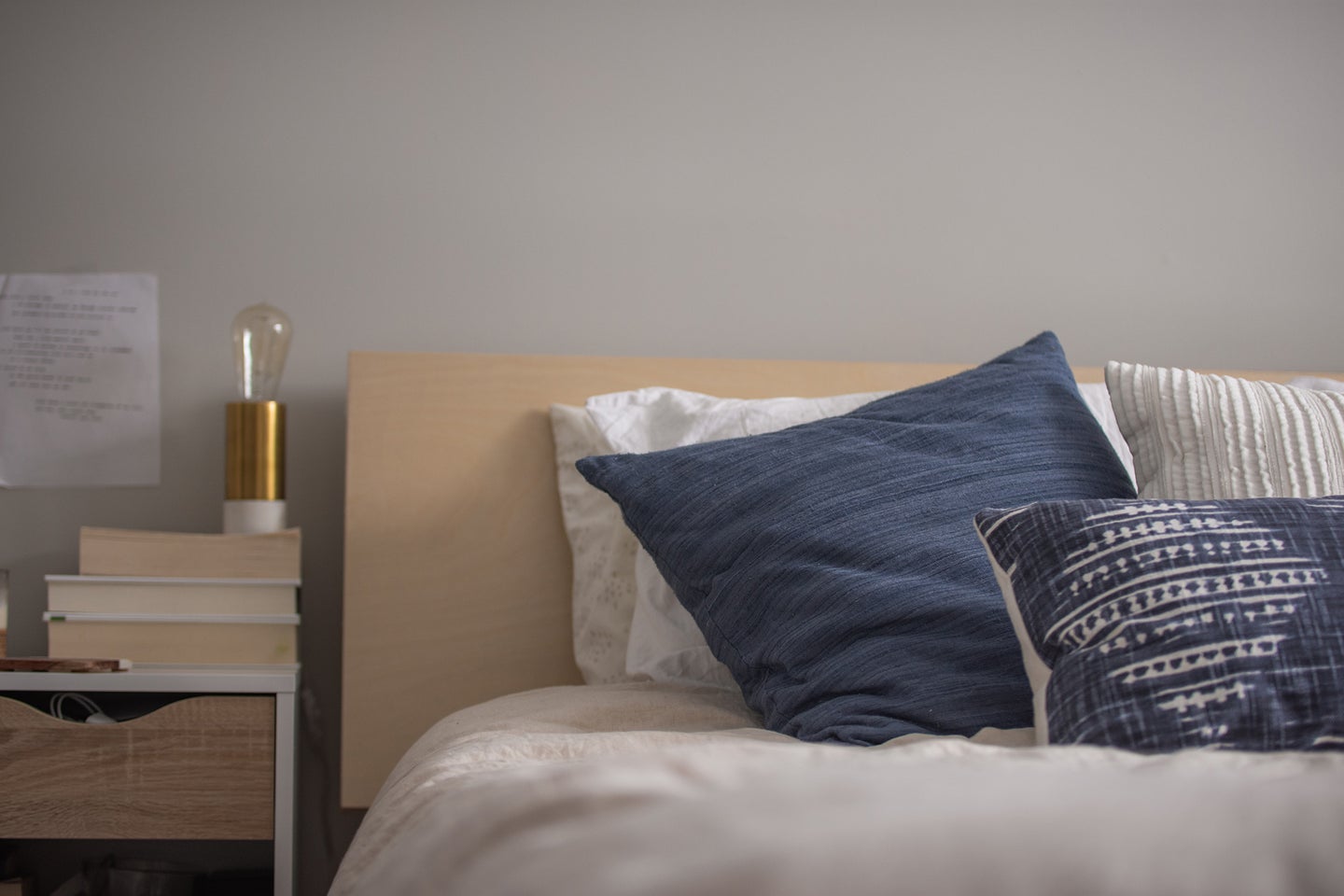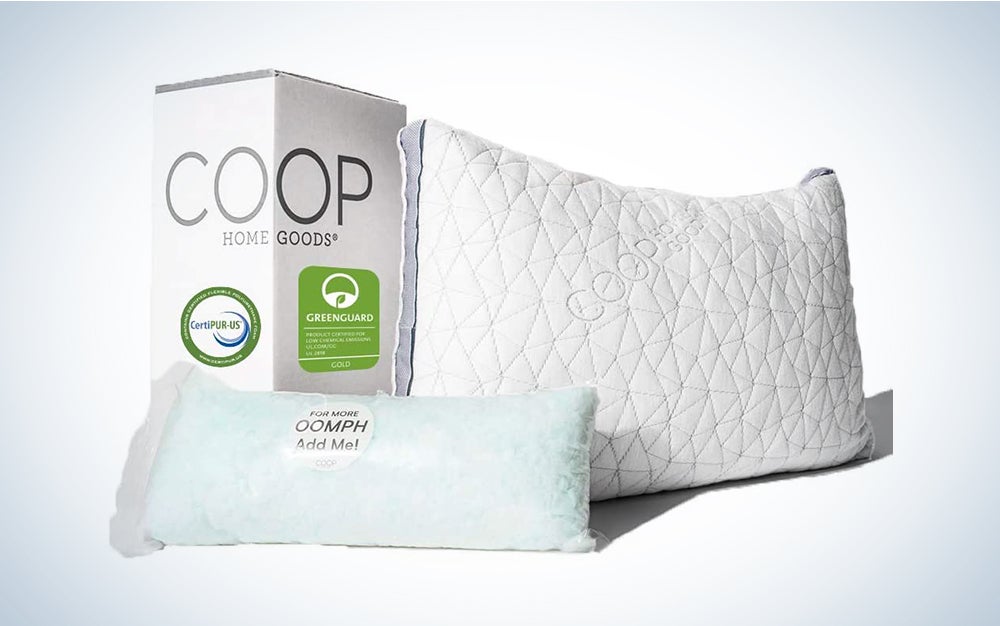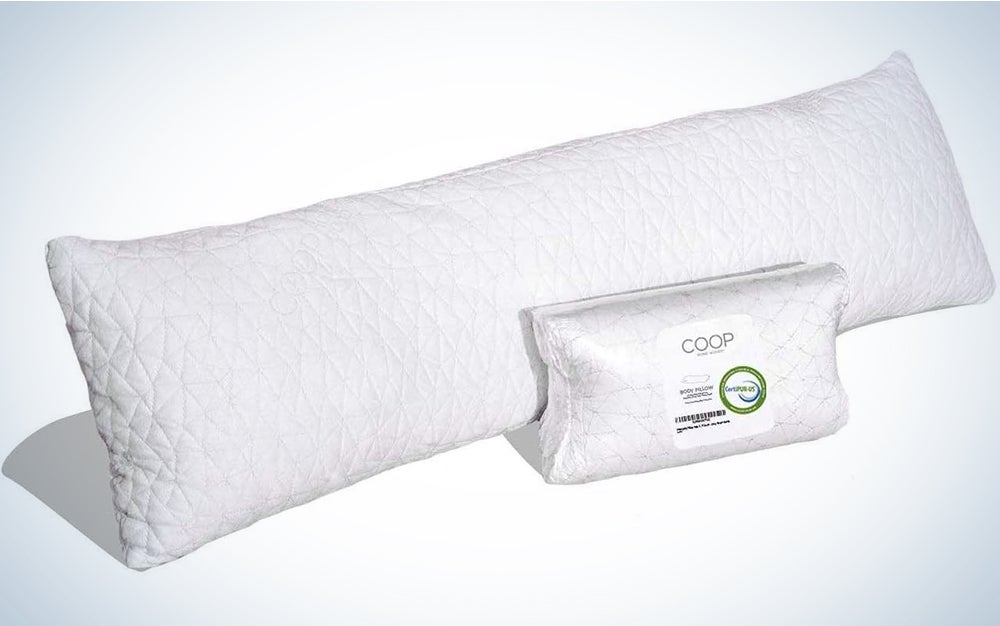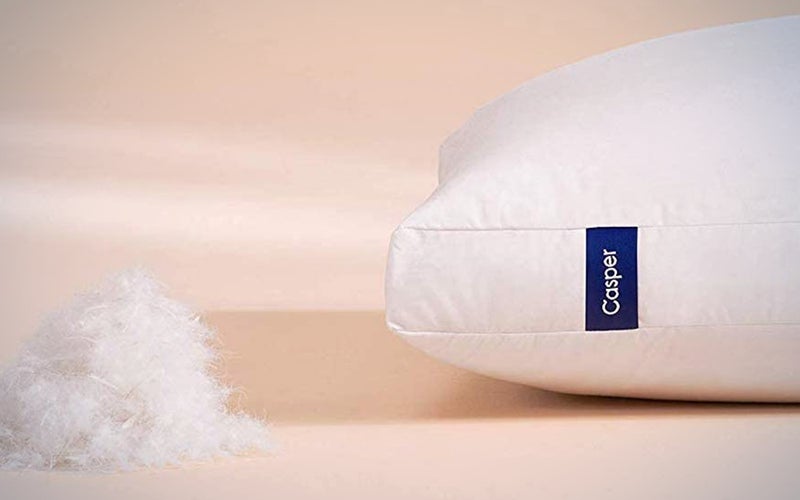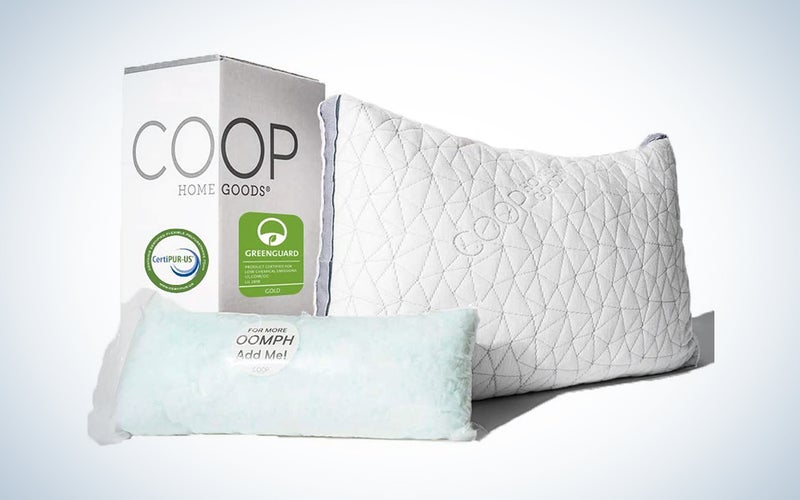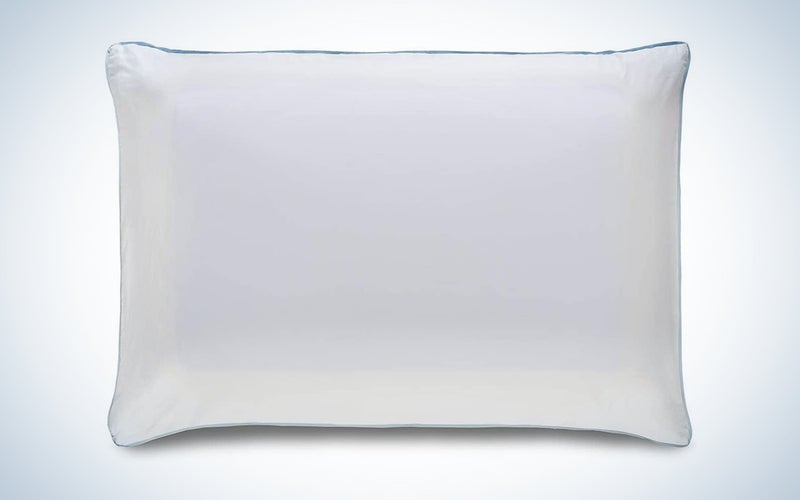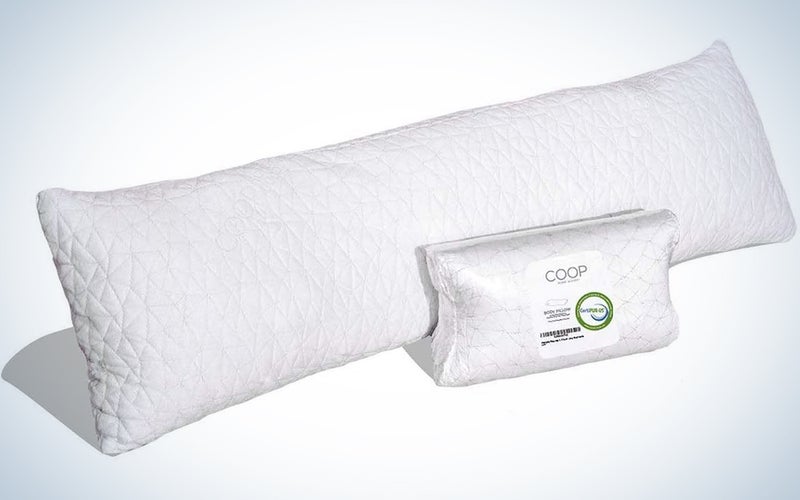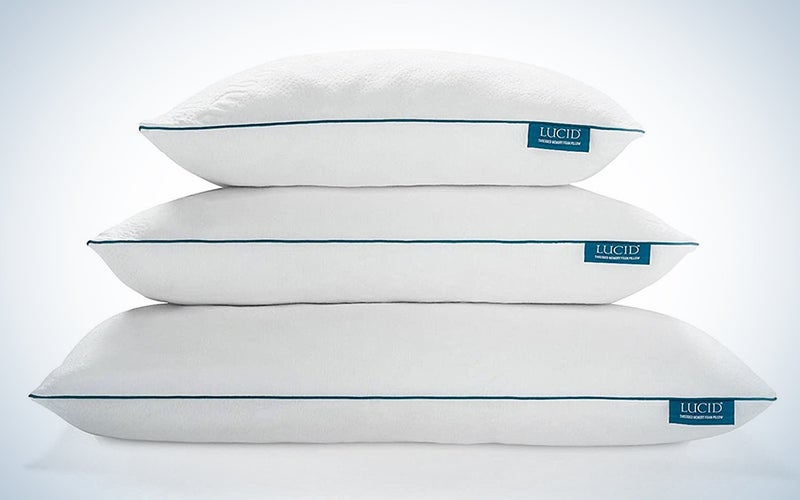We may earn revenue from the products available on this page and participate in affiliate programs. Learn more ›
Whether you just bought a new bed, or the pillow you’ve been using is old, lumpy, and smelly, getting a new pillow is never a bad idea. You should replace yours every one to two years to provide enough support and prevent your head and neck from sinking too far into the cushion. You should always replace your pillow when you notice it has begun to yellow despite washing, or if you can easily fold it in half. A new pillow provides better support at night, and regular replacement can reduce allergies to provide a more restful sleep experience.
There are so many options available that choosing the best one for you can be challenging. We’ve created this comprehensive guide to buying the perfect pillow for you (and your family, and your sleepover guests). While it’s not a traditional gift, the best pillows could be just the right thing for a friend—especially one who doesn’t put much effort into selecting household essentials.
- Best overall: Casper Sleep Down Pillow
- Best for any sleep position: Coop Home Goods Eden Adjustable Pillow
- Best for hot sleepers: Tempur-Pedic Cloud Breeze Dual Cooling Pillow
- Best for body: Coop Home Goods Adjustable Body Pillow
- Best budget: LUCID Premium Shredded Memory Foam Pillow
The best pillows: Reviews & Recommendations
Best overall: Casper Sleep Down Pillow
Casper
The Casper Sleep Down Pillow is a great option for people who favor a light, soft pillow. It comes in a standard and king size, with an outer fabric made out of 100% cotton, inner fabric made from 100% polyester, and a fill of white duck down and feathers. The feathers are ethically sourced, and the material is breathable, which prevents overheating when you’re asleep. It has a two-inch gusset along the side to support your neck and help align your spine. It’s also fairly soft, so even stomach sleepers can prop it under their heads. Best of all, it’s machine-washable for easy maintenance. If you need extra support, check out Casper’s standard foam fill.
Best for any sleep position: Coop Home Goods Eden Adjustable Pillow
Coop Home Goods
This adjustable Coop pillow is ideal for almost any sleep position. This is also great to keep you cool at night. The Eden is filled with shredded foam that you can add to or detract from, creating perfect size and firmness. It’s vegan and cruelty-free to give you ease of mind as you drift off, and the hypoallergenic case allows you to wake up peacefully. The package even comes with a separate fill bag, so you won’t need to place another order. The foam is gel-infused, which assists temperature control, and comes in standard, queen, and king sizes. Whether you’re looking for the best pillow for side sleepers or for stomach sleepers, this one is a great choice.
Best for hot sleepers: Tempur-Pedic Cloud Breeze Dual Cooling Pillow
Tempur-Pedic
The Cloud Breeze the best cooling pillow to stay comfortable at night while getting the right amount of support. The fill is a thick layer of memory foam surrounded on both sides by two layers of cooling gel encased in a quilted, washable cover. It provides a medium level of firmness, so it might not be the best pillow for stomach sleepers, but it’s going to be great for all other positions (or even stomach sleeps who tend to switch it up as they sleep). This durable pick also doesn’t lose its shape, giving you long-term support. This Tempur-Pedic pillow comes in a queen and king size and measures roughly 6.5 inches tall.
Best for body: Coop Home Goods Adjustable Body Pillow
Coop Home Goods
Like the Eden, the Coop Home Goods body pillow is super-adjustable. It’s made from shredded memory foam that is easily added to, using extra fill to customize the shape and support specific areas. It measures 54 x 20 x 7 inches, which fits nicely at the head of most beds and can accommodate both short and tall sleepers. This is one of the best pregnancy pillows, as it supports healthy alignment and conforms to your body. It also encourages side-sleeping, which can help reduce snoring, and it supports your knees, stomach, back, and hips. The cover is machine-washable, and the material is hypoallergenic, providing restful sleep for allergy sufferers.
Best budget: LUCID Premium Shredded Memory Foam Pillow
While something top-quality is typically going to run you over $50, there are plenty of options out there that are a bit more budget-friendly. You probably won’t be able to find a 100% down pillow or top-notch memory foam for less, but you can find several poly-fill, gel, or shredded foam options. All sizes of the LUCID Memory Foam Pillow come in at under $50. Its latex and memory foam blend help you mold it to your comfort, and the cooling gel foam keeps you cool. The moisture-wicking cover is great for hot sleepers.
What to consider when buying the best pillows
A pillow is nothing more than a straightforward square or rectangular chunk of fabric and filler with the simple task of cradling your head as you sleep. Remember, though, that it will be supporting your upper half for thousands of hours, so it’s worth investing a little time and energy into choosing the right one. Below are five key things to consider as you start thinking about the right selection for you. We’ll examine pillow fill material, your sleep position, and special features. There’s also a bonus section just for pillows that help support other body parts.
Sleep position
Though you probably cycle through different positions—your back, your side, your stomach—throughout the night, your most common sleep position can have specific health benefits or consequences, so it’s a good idea to find a pillow that complements that pose. If you’re one of the lucky few who naturally sleeps on your back (which naturally gives you adequate rest while aligning your spine), look for one with medium firmness and loft to elevate the neck slightly. Foam pillows are particularly good for back sleepers because they gently lift your head without letting it sink into the pillow and having it fold over your face.
The best pillow for side sleepers will be tall with a high loft and firm support. That’s because you want the pillow to relieve pressure on the bottom shoulder by lifting the head and elongating the neck. Note that “firm” doesn’t mean stiff or rigid here, so side sleepers should get a pillow that can be fluffed and molded for maximum support. Look for fills that contain latex, Kapok, or shredded foam.
Things get more complicated for stomach sleepers. Sleeping on your stomach is generally not recommended because it puts pressure on your abdomen and can result in lower back pain. However, we know change can be challenging, so while you work on adjusting your sleep position, look for a pillow with a low loft, which puts the top closer to the mattress, and is filled with soft support from down or feathers. You might also want to investigate an adjustable-fill pillow, which you can zip open to add or subtract contents as necessary. This is one of the best for stomach sleepers who lift their head by placing their arms underneath rather than at their sides because it allows you to get the pillow to the exact height you need.
Pillows for other body parts
We would be remiss if you didn’t encourage you to check out some pillows for other parts of your body. Designs for other body parts, including pillows that provide support for your entire body, can be a great source of relief for those who are pregnant, have stiff joints, sore muscles, or bad backs. For example, body pillows are particularly long and can wrap fully around the body, supporting the back and stomach. The design makes them some of the best options for side sleepers and pregnant snoozers who need a little more support. Despite their size, you can easily place them behind decorative throws at the head of the bed when not in use.
Wedge pillows are super for getting your snoring to subside. By keeping your head above your neck and chest, but still in line with your spine, you can also relieve cold symptoms associated with mucus build-up or sinus pressure.
Knee pillows are designed to fit in between the legs when sleeping on the side. They have a cross-section in the shape of the number eight, providing support for your thighs and calves. A knee pillow can open up misaligned hips and take pressure directly off of your lower back.
Pillow firmness
There are various options available for pillow fill. First, let’s talk down, which is made from duck or goose down (the softest, fluffiest feathers), other duck or goose feathers, and other fill particles. A down option is relatively light and soft. You can even find hypo-allergenic down, which is composed of a cleaned pure down and a natural substance called syriaca to prevent allergic reactions. Down options have long lifespans and provide optimal comfort. Some are advertised as being made of synthetic down, which means they’re filled with materials such as polyester. They need to be replaced more frequently than natural down and skew towards medium on the softness scale, but are less expensive than real down. Wool and cotton fills are also hypoallergenic and long-lasting but are firmer than down.
Memory foam pillows and mattresses are extremely popular these days, although memory foam is technically not a fill. Foam is a great way to get a pillow that contours specifically to your shape, which can be instrumental in relieving head, neck, and shoulder pain. Memory foam works by evenly supporting and distributing weight, which relieves stiffness in joints and pressure points. If you tend to run hot while you sleep, know that memory foam also retains heat, though some come with shredded foam or vents and cooling fabrics to offset this effect. You can also find some with microbead, buckwheat hull, and kapok (a cotton-like material).
Special features
Just like tech, pillows can have special features too. If you tend to run hot at night, look for a pillow that’s washable, because sweat can yellow a pillow and make it smell. You should also look for a cooling pillow that has cooling technology beyond moisture-wicking or generic fabric type, such as cooling gel pads or infused fills, heat absorption, or pinhole core ventilation. Another popular special feature is an anti-snore design. While you should always consult your doctor first, adjusting your head level can provide some profound relief. Anti-snore pillows often come in the shape of a wedge, but you can also find smaller pillows to use as a level or an insert along with your current one. Other special features include vibration technology and glow lights.
FAQs
Q: How often should you replace pillows?
You should replace pillows every two years. One, because they can get downright gross. Two, because they contain allergens like dust mites, pet dander, and even mold.
Q: How often should I wash my pillow?
If you’re able to wash your pillow, you should do so at least twice a year. You should wash it quarterly—aka four times a year—if you sweat a lot or have pets that sleep on the bed. Body pillows and throw pillows should be washed every 3-6 months.
Q: How do I know if my pillow is too high or too low?
Pillow height is also known as loft. It refers to the thickness or height of the pillow. If your chin points down or if you can see your feet, your pillow is too high. If your head tilts back, your pillow is too low. Ideal loft is usually 4-7 inches. Your ideal pillow loft also depends on your sleep position. Side sleepers should aim for a high or mid pillow loft. Back and combination sleepers should gravitate toward a mid pillow loft. Stomach sleepers need a low pillow loft.
Final thoughts on the best pillows
- Best overall: Casper Sleep Down Pillow
- Best for any sleep position: Coop Home Goods Eden Adjustable Pillow
- Best for hot sleepers: Tempur-Pedic Cloud Breeze Dual Cooling Pillow
- Best for body: Coop Home Goods Adjustable Body Pillow
- Best budget: LUCID Premium Shredded Memory Foam Pillow
Never settle when it comes to finding the best pillow that is right for your sleep position, body size, and comfort. From the best travel pillows to the best pregnancy pillow, you want to make sure you’re getting the right design for you. Once you decide on the fill and firmness that works, consider if it is the correct height. Once you have the pillow, you may have to set your alarm a few minutes early because you very well might have trouble getting out of bed after such a restful sleep!
Why trust us
Popular Science started writing about technology more than 150 years ago. There was no such thing as “gadget writing” when we published our first issue in 1872, but if there was, our mission to demystify the world of innovation for everyday readers means we would have been all over it. Here in the present, PopSci is fully committed to helping readers navigate the increasingly intimidating array of devices on the market right now.
Our writers and editors have combined decades of experience covering and reviewing consumer electronics. We each have our own obsessive specialties—from high-end audio to video games to cameras and beyond—but when we’re reviewing devices outside of our immediate wheelhouses, we do our best to seek out trustworthy voices and opinions to help guide people to the very best recommendations. We know we don’t know everything, but we’re excited to live through the analysis paralysis that internet shopping can spur so readers don’t have to.
